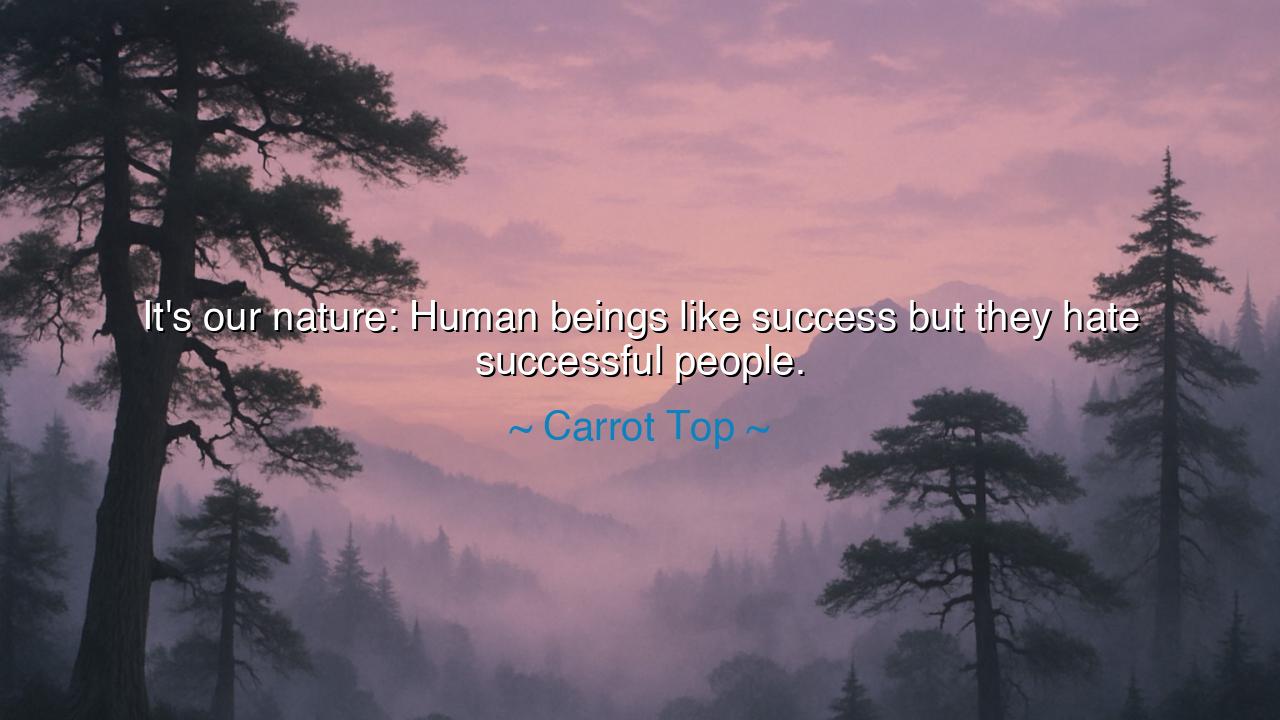
It's our nature: Human beings like success but they hate






The words of Carrot Top, though spoken with simplicity, carry the weight of an ancient paradox: “It’s our nature: Human beings like success but they hate successful people.” Here is the eternal tension of mankind, a truth seen in every age. Men admire the light of victory, yet often despise the one who bears the torch. They cheer for triumph when it is far from them, yet when it dwells in their neighbor’s house, envy stirs like a serpent in the grass. This is the duality of the human heart—that we revere success, but we struggle against the shadow it casts upon our own pride.
The origin of this wisdom lies not only in the mouth of the modern jester, but in the experience of all who have risen to greatness. From the dawn of history, the crowd has loved the dream of glory, yet despised the one who achieved it. Why? Because success is a mirror. It reflects back to others their own failures, their untried efforts, their neglected courage. And what men cannot bear to face within themselves, they turn outward as scorn for the one who has dared and won.
Consider the life of Julius Caesar. The Roman people adored conquest, they glorified empire, they longed for Rome to be mighty above all others. Yet when Caesar himself achieved this vision—crossing the Rubicon, returning victorious from Gaul, crowned with triumph—they turned against him. His peers conspired, whispering of tyranny, not out of love for liberty alone but out of envy for his greatness. Thus, the very people who desired success struck down the man who embodied it.
History offers countless such tales. Socrates was condemned by his city not because he failed, but because he shone too brightly in wisdom, showing others their ignorance. Joan of Arc was betrayed not because she faltered, but because she succeeded in leading armies and stirring faith where others could not. The world delights in the idea of success, but often crucifies the soul who brings it forth. In this way, Carrot Top’s words echo across centuries with an almost tragic consistency.
Yet this truth, though heavy, must not dishearten us. For if we know that human nature admires success yet resents the successful, we are freed from the snare of craving approval. Let the wise understand: greatness will never win the full love of the crowd. One must therefore strive not for universal praise, but for inner fulfillment, for loyalty to purpose, and for the joy of achievement itself. The applause of others fades quickly, but the triumph of spirit endures.
The lesson for us is clear: when you see success in others, do not fall into envy, but let it be a torch to light your own path. And when you yourself find success, do not waste your days seeking the approval of those who might resent you. Instead, surround yourself with the few who celebrate without envy, and extend your own hand of encouragement to those who struggle. In this way, you break the ancient curse of envy and turn it into a cycle of inspiration.
Practically, this means practicing gratitude when others rise, instead of resentment. It means turning admiration into action—asking, “What can I learn? How can I grow?” rather than whispering bitterness. And when fortune smiles upon you, walk with humility, knowing that the crown of success is both heavy and fragile. Share your knowledge, lift others where you can, and let your life become not a source of envy, but a source of light.
Thus remember: “Human beings like success but they hate successful people.” Let these words teach you not to despair, but to walk the higher road. Admire success without envy, embrace your own without arrogance, and in doing so, live above the petty nature of the crowd. For true greatness is not only in the winning, but in rising above the hatred that winning can bring.






AAdministratorAdministrator
Welcome, honored guests. Please leave a comment, we will respond soon